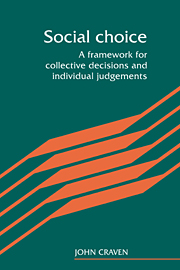5 - Strategic manipulation of choice rules
Published online by Cambridge University Press: 15 September 2009
Summary
In section 3.3 we discussed briefly the relation between the independence condition and the possibility that individuals might state a false preference in order to change the outcome of the social choice rule. With independence the scope for this sort of manipulation is very limited and so there is a close relation between independence and any requirement that people should not be able to gain by stating a false preference. Unfortunately, independence plays a major role in demonstrating the inevitability of dictatorship. So it would appear likely that, if we want a social choice rule that gives no-one any opportunity for gaining by stating a false preference and that satisfies others of the conditions of Arrow's theorem, we will end up with a dictator. Even with less stringent rationality requirements than those of Arrow's theorem, we are likely to have an oligarchy or a collective.
There are many social choice rules that satisfy all of Arrow's conditions except independence – including rules that give choices that can be derived from a complete and transitive social preference relation using the Condorcet criterion. For example, the first-past-the-post electoral system, satisfies all of the conditions except independence. Independence fails with first-past-the-post because it is plainly necessary to know preferences concerning all of the alternatives to determine which is most preferred by most people.
- Type
- Chapter
- Information
- Social ChoiceA Framework for Collective Decisions and Individual Judgements, pp. 67 - 84Publisher: Cambridge University PressPrint publication year: 1992



